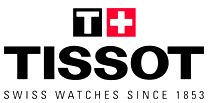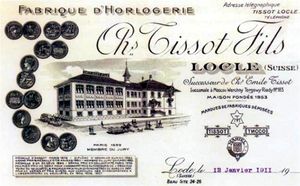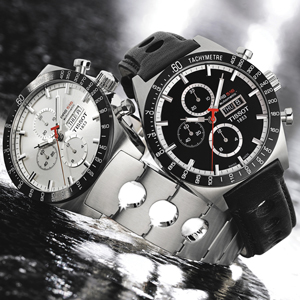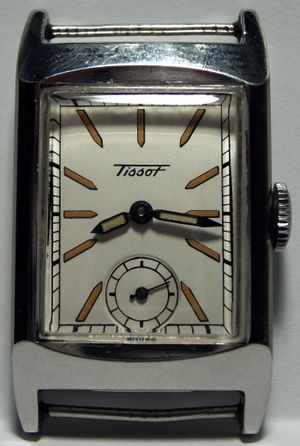Tissot SA/en: Unterschied zwischen den Versionen
| Zeile 63: | Zeile 63: | ||
[[1988/en|1988]] Wood Watch, the first watch in wood | [[1988/en|1988]] Wood Watch, the first watch in wood | ||
| − | 1991 Ceraten | + | [[1991/en|1991]] Ceraten |
| − | 1998 Titanium 7 | + | [[1998/en|1998]] Titanium 7 |
| − | 1999 T-Collection | + | [[1999/en|1999]] T-Collection |
| − | 2000 T-Touch | + | [[2000/en|2000]] T-Touch |
== Management == | == Management == | ||
Version vom 12. Januar 2012, 01:56 Uhr
Tissot SA
(see also Tissot)
Tissot 1853-2008 - 154 years of Innovation and Pioneering spirit - Covering Five Continents
From 1853 to 2008 Tissot has never ceased to surprise and delight its customers with innovation in its products. However, its innovation does not stop there and its pioneering spirit that has guided the brand from its first beginnings in the small Jura town of Le Locle to a presence in 150 countries in the 5 continents of the world. Innovation is shown in its products from the two time-zone watch of 1853 to the highly technical T-Touch Titanium watch of today, passing by such landmarks as the “banana” watch of 1916, the antimagnetic watch of the 1930s and the Pearl, Wood and Rock watches of the 1980s. However, this innovation is also alive in all aspects of the brand including its distribution policy, its marketing and communication and its sponsoring, inspiring even the watch customers themselves to find new and innovative methods to put their Tissot watches to the test. Tissot is proud of this heritage of innovation and the spirit that has inspired its employees over the last 154 years, making the brand what it is today.
In 1853 in Le Locle, a small Swiss town of 8,500 inhabitants in the Jura mountains on the border with France, the Tissot brand was born.
From the very beginning the brand was destined to be more than just a local creation, as Charles-Emile Tissot, son of the founder Charles-Félicien, had plans for expansion and expansion far beyond the Swiss borders. It is this pioneering spirit that has helped make the brand what it is today and which is still and underlying value in everything undertaken.
In 1858 therefore Charles-Emile left Le Locle with a sample of pocket watches to travel to Russia, land of the Tsars and a country synonymous at the time with patronship of the arts and technical innovation. It was there that the Tissot savonnette pocket watches came into their own. Regarded as too bulky by the local Swiss population, they were greeted with favour by the Russian bourgeoisie, with special editions created for the Tsar and his officers. The 1904 watch created for an officer of the Imperial Russian Guard and embossed on the back with the Order of the Star – “Faithful to the Faith” still remains part of the replica collection today. An adventure therefore which lasted nearly twenty years with Charles-Emile travelling across the vast Russian Empire (usually in little more than a light Tarantass carriage) from St Petersburg to the shores of the sea of Okhotsk.
Russia however, although proving to be the biggest market for Tissot at that time, was not the only one to which Charles-Emile turned his attention, for the USA and Latin America also saw the arrival of this intrepid traveller. His first visit, according to his passport dated back to 1848, whilst still perfecting his watchmaking apprenticeship, and five years before the company was formally formed, but it obviously made a deep impression and commercial activity started for the company there in 1866. Charles –Emile’s presence was also felt at the Universal Exhibition in Chicago in 1893, where he was member of the Jury for the Swiss Confederation.
Tissot also expanded naturally to Europe, winning a number of medals at the Exhibitions in Paris (Silver medal 1878 and gold in 1889), Anvers (Antwergen) (Gold medal 1890) Geneva (Gold medal 1896) and a Grand Prix in 1900 at the Great Exhibition in Paris, where a Tissot watch was acquired by the famous actress Sarah Bernhardt. A number of other well-known personalities around the world also joined the ranks of Tissot owners, among them the South American singer Carmen Miranda in 1947. On 9th November 1960 during a visit to the factory in Le Locle, a watch was presented to their Royal Highnesses Prince Rainier and Princess Grace of Monaco for Princess Caroline.
But if Tissot’s pioneering spirit first became apparent in its expansion ethic, it was also evident in its means of promoting and marketing its creations. In the 1940s, a Tissot balance-spring fitter appeared in the shop windows in the principal Swiss stores, an illustration that the company’s employees could be seen as the best ambassadors of the brand … a revolutionary idea for the time. If such techniques are no longer used today, the brand still continues to push the boundaries of innovation with its new merchandising techniques, the video screens that today grace the major Tissot points of sale having been given the British POP Award and the POPA Merchandising Award in 2001.
For promotional purposes also innovation was always important. In 1966 the Tissot logo adorned the sails of the Sora Delio yacht in the Adriatic between Venice and Rimini and the car of Peruvian racing driver Henry Braedley sported the Tissot PR516 in 1968, at a time when such logo usage was far from being the norm. Today the Tissot logo is an indication of the company’s partnership as “Official Timekeeper” of prestigious world class events throughout the world. The World Championships in MotoGP, Cycling, Ice Hockey, Fencing; NASCAR, AFL and CBA illustrate this quest for personal performance, technological innovation and precision.
As figure head of its sponsorship activities, Tissot is proud to have Michael Owen who incarnates the true human values of the brand and has been a faithful ambassador since 10 years. 2006 marked the arrival also of two new sports star with the pioneering female IndyCar driver, Danica Patrick and the dynamic World Champion in MotoGP 2006 Nicky Hayden.
In 2005, Tissot signed an agreement with Barbie Xu to act as ambassador for a series of promotional activities in China, Hong Kong and Taiwan, as well as being the Chinese face of Tissot worldwide. Barbie Xu, who has starred in a number of Chinese television shows as well as being a singer and author, represents the fine combination of beauty and intelligence much prized by Chinese society and she is seen as a role model by many young Chinese women.
In December 2007, Tissot signed an agreement with Deepika Padukone to become the brand’s ambassador in India and the “Face of Tissot” worldwide. This is the first time that the Swiss watch brand has chosen an Indian ambassador and underlines the importance that Tissot places on this dynamic market. Deepika is one of India’s most sought-after actresses and an international model. She is multi-talented, hard working, dynamic and always open to new ideas - characteristics that perfectly complement the world of multi-facetted, innovative Tissot
The spirit of innovation also inspired the Tissot customers and from mountaineers on expeditions to reach the highest peaks to divers in the depths of the oceans, there have always been people willing to put Tissot watches through their paces in the most surprising circumstances, be this the T-12 Automatic watch in 1965 for the ascent of the Tsacra Grande in the Peruvian Andes, to the T-Touch today in the mountains of Nepal.
Above all, however, where Tissot’s pioneering spirit and innovation are most in evidence is of course in the development of its products. From its first pocket watch with two time-zones in 1853 to its revolutionary touch-screen technology T-Touch watch, Tissot offers a series of “firsts” in product innovation, that surprise and delight through their innovative use of technology, materials and design. The “Banana” or Classic Prince watch in 1916 with its curved case that embraces the form of the wrist, the Astrolon, the first watch with plastic movements in 1971, the Two-Timer of 1986, offering two time-zones in analogue and digital time all controlled with a single crown, the Multi-time-zone watch of the Navigator in 1953, enlarged to create the “World Watch” and the T-Win line with two watches in one, just with a “twist on the wrist” are all illustrations of Tissot firsts in technological prowess. The Bellflower gold with its use of knitted gold threads to create the extendable “Milanais” bracelet is unique in its genre, silver bangles were transformed into avant-garde Tissot watches by a Finnish designer in 1974 in a style that still appears modern today. Faithful to its Swiss origins, Tissot used the Alpine granite of the Swiss mountains to create the celebrated Rock Watch in 1985, using stone not only from the Swiss mountains but also from countries from around the world, and continued this innovative use of materials with the Pearl Watch in 1987 and Wood Watch in 1988.
2008 is more than ever “the tactile year” of Tissot. The brand launches the T-Touch Expert for outdoor adventurous and a high performance tactile diving watch the Atlan-T.
154 years if innovation therefore, made possible in recent times by Tissot’s incorporation into the Swatch Group, with at its head Dr NG Hayek, with whose own pioneering spirit the Tissot brand values are perfectly in tune. From a small town, lost in the Jura mountains, Tissot’s renown has now spread to over 150 countries in five continents around the globe and the brand has come to represent Swiss quality and precision. Above all, a Tissot watch always has a story to tell and the brand is constantly in movement with new designs and technological achievements to surprise and delight its customers around the world. Proof of its corporate claim: Innovators by Tradition.
Tissot, with its signature ‘Innovators by Tradition’, has been pioneering craftsmanship and innovation since its foundation in 1853. Today Tissot is a member of the Swatch Group, the world’s largest watch producer and distributor. For over 154 years the company has had its home in the Swiss watch making town of Le Locle in the Jura mountains but now also has a presence in over 150 countries. The Tissot innovation leadership is enabled by the development of high-tech products, special materials and advanced functionality. With a broader, more versatile range of high-quality timepieces at an attractive price than any other Swiss watch brand, Tissot also expresses its commitment to making excellence accessible. As official timekeeper and partner of NASCAR®, AFL, CBA, MotoGP and the World Championships of cycling, fencing and ice hockey, Tissot is committed to respecting tradition, underlining its core values of performance, precision and setting new standards. For more information: www.tissot.ch
TISSOT in a few creations
1853 First production of pocket watches
1917 "Banana" watches
1930 The first antimagnetic watch
1953 Navigator
1965 PR 516
1971 IDEA 2001(Astrolon), the first plastic watch
1978 F1 watches for the Lotus racing team
1985 Rock Watch, the first watch in stone
1986 Two Timer
1988 Wood Watch, the first watch in wood
1991 Ceraten
1998 Titanium 7
1999 T-Collection
2000 T-Touch
Management
Dr h.c. Nicolas G. Hayek President of the Swatch Group Board of Directors
François Thiébaud President of Tissot SA Member of the Swatch Group extended Management



